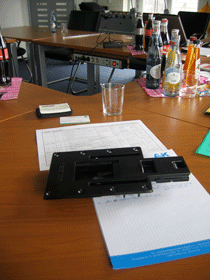Injection molding: Thermoset molder claims first for office furniture hinges
In what the processor of the parts is calling an industry-wide first, Austrian office furniture manufacturer Wiesner Hager is replacing cast aluminum parts on a high-end folding table with injection molded thermoset plastics. For the processor, the journey to thermosets actually started with the assumption that wood/plastic composites would be used.
June 2, 2010
In what the processor of the parts is calling an industry-wide first, Austrian office furniture manufacturer Wiesner Hager is replacing cast aluminum parts on a high-end folding table with injection molded thermoset plastics. For the processor, the journey to thermosets actually started with the assumption that wood/plastic composites would be used.
|
My bad photo, but shown is a nice thermoset molding for the hinge of an upscale folding office table. |
Rudi Hager, sales manager in the injection molding unit at MKW Kunststofftechnik (Weibern, Austria), and no relation to the furniture manufacturer, told MPW that the processor had been tasked to look at replacement of cast aluminum parts, sourced by the furniture manufacturer from Asia, with ones molded from wood/plastic composites (WPCs). With almost no European manufacturers of these remaining, the small (about €49 million/yr in sales) company was dependent on a long supply chain for the aluminum parts. Four parts were to be transitioned to plastics: a hinge with its housing, and a locking element with its housing.
MKW eventually decided that WPCs were the wrong material for the applications, but convinced the customer to opt for thermoset plastics. The processor works with thermoplastics and thermoset plastics, and claims to be the largest processor of thermoset toilet seats in Central Europe.
The grade finally chosen was Resinol EPF 87120, loaded with 40% glass fiber and 30% glass balls and supplied by Raschig. The thermoset is about half the cost of the polyamide thermoplastic grade that also was tested, he said. Although the parts are on the table's underside, appearance still mattered, and the thermoset moldings' appearance is better than for thermoplastics, said Hager. The furniture manufacturer commercially introduced the tables with the new hinges and locking elements in early 2010. Piece costs for the thermoset moldings are lower than the comparable aluminum ones, said Hager. Though the injection molds were more costly than the tooling used for the cast aluminum parts, the breakeven point between the two falls within the product's intended lifecycle.
For MKW, the project won it a new customer and its entry into a new market. In 2009 the family-owned processor earned about €40 million in revenue with its four facilities (two in Austria, one each in Solvakia and Russia) and roughly 400 employees. —Matt Defosse
About the Author(s)
You May Also Like



